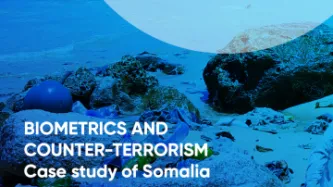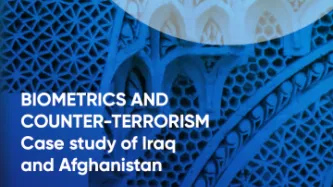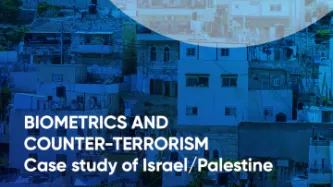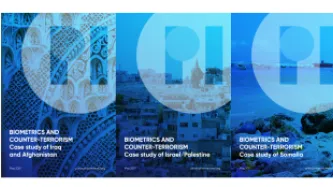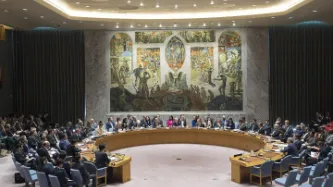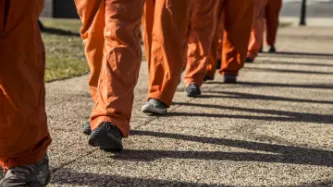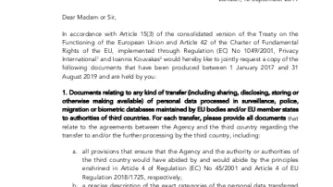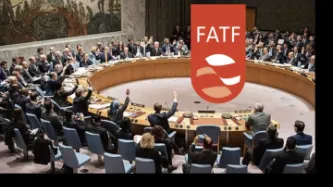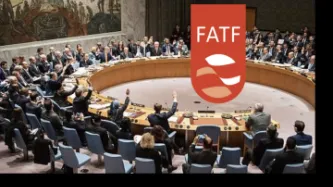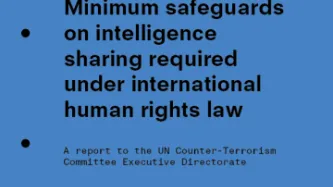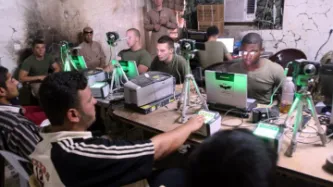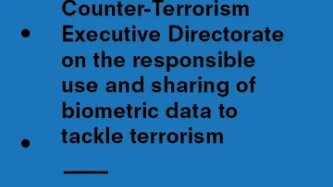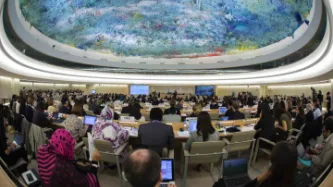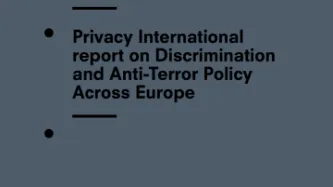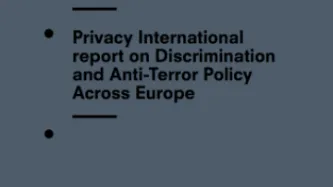Search
Content type: Advocacy
Privacy International welcomed the opportunity to provide input to the study of the UN Human Rights Council Advisory Committee on the human rights implications of new and emerging technologies in the military domain (NTMD) to be presented to the Human Rights Council at its sixtieth session.In the course of our work, we observe that the line between military and civilian technologies is blurring. Governments are increasingly relying on the very same technologies for military and civilian uses.…
Content type: Advocacy
The submission provides PI’s information and analysis of some of the topics listed in the call. The widespread use of new technologies presents both opportunities and challenges for the protection of human rights, including the right to life and the right to privacy. PI believes that is essential that states take a human rights-centered approach in their use of these technologies, and ensure that their use is consistent with international human rights law. By doing so, states can ensure that…
Content type: News & Analysis
After almost 20 years of presence of the Allied Forces in Afghanistan, the United States and the Taliban signed an agreement in February 2020 on the withdrawal of international forces from Afghanistan by May 2021. A few weeks before the final US troops were due to leave Afghanistan, the Taliban had already taken control of various main cities. They took over the capital, Kabul, on 15 August 2021, and on the same day the President of Afghanistan left the country.
As seen before with regime…
Content type: Video
<br />
Biometric data collection and use in the name of countering terrorism has been accelerating around the globe, often abusively, without being effectively regulated or subject to accountability mechanisms
This week we talk to Fionnuala Ní Aoláin, UN Special Rapporteur on Human Rights & Counter-Terrorism, Nina Dewi Toft Djanegara about biometrics in Afghanistan and Iraq, and Keren Weitzberg about uses in Somalia and Palestine.
Links
Read more about uses in Iraq…
Content type: Report
In Somalia, international entities like the US Department of Defense (DoD) and intergovernmental organizations such as the United Nations (UN) have used biometrics in the name of counterterrorism, collecting and indefinitely storing biometric data, frequently in the absence of full disclosure or appropritate regulation. These biometric initiatives have had dubious benefits and known detrimental effects on local populations. Nevertheless, most Somalis have little knowledge or say over how their…
Content type: Report
In Afghanistan and Iraq, the U.S. Department of Defense developed its biometric program in confluence with US military operations in. Its expansion was tightly linked to the goals of military commanders during the “War on Terror”: to distinguish insurgents and terrorists from the local civilian population. This research shows how the DOD’s biometric programme was developed and implemented without prior assessment of its human rights impact and without the safeguards necessary to prevent its…
Content type: Report
In Israel/Palestine, the Israeli government has been deploying biometrics, including cutting-edge facial recognition technology, in the name of counter-terrorism. The Israeli state routinely surveils and severely restricts Palestinians’ freedom of movement using myriad technologies, including biometrics, which result in furthering the policies of systemic segregation. Since many Palestinians live under Israeli occupation, they have little control over the way their sensitive data is turned…
Content type: Long Read
Since the September 11th attacks, decision makers across the globe have embraced overreaching surveillance technologies. The global “War on Terror” ushered in and normalized an array of invasive surveillance technologies. Collection and storage of biometrics data and the application of statistical methods to such data have been touted as uniquely suited to twenty-first century threats. Yet, biometrics technologies are not seamless, panoptic technologies that allow for perfect control. They can…
Content type: News & Analysis
The UN Special Rapporteur on the promotion and protection of human rights and fundamental freedoms while countering terrorism, Professor Fionnuala Ní Aoláin together with Dr. Krisztina Huszti-Orbán, released today a key report on the “Use of Biometric Data to Identify Terrorists: Best Practice or Risky Business?”.
The report explores the human rights risks involved in the deployment of biometrics emphasising that
in the absence of robust rights protections which are institutionally embedded…
Content type: News & Analysis
Today Advocate General (AG) Campos Sánchez-Bordona of the Court of Justice of the European Union (CJEU), issued his opinions (C-623/17, C-511/18 and C-512/18 and C-520/18) on how he believes the Court should rule on vital questions relating to the conditions under which security and intelligence agencies in the UK, France and Belgium could have access to communications data retained by telecommunications providers.
The AG addressed two major questions:
(1) When states seek to impose…
Content type: Press release
Today the Advocate General (AG) of the Court of Justice of the European Union (CJEU), Campos Sánchez-Bordona, issued his opinion on how he believes the Court should rule on vital questions relating to the conditions under which security and intelligence agencies in the UK, France and Belgium could have access to communications data retained by telecommunications providers.
The AG advises the following:
The UK’s collection of bulk communications data violates EU law.
The French and Belgium…
Content type: Case Study
On 3 December 2015, four masked men in plainclothes arrested Isnina Musa Sheikh in broad daylight (at around 1 p.m.) as she served customers at her food kiosk in Mandera town, in the North East of Kenya, Human Rights Watch reported. The men didn’t identify themselves but they were carrying pistols and M16 assault rifles, commonly used by Kenyan defence forces and the cars that took her away had their insignia on the doors. Isnina’s body was discovered three days later in a shallow grave about…
Content type: Case Study
The prohibition against torture is absolute. There are no exceptional circumstances whatsoever which can be used to justify torture.
And yet, torture is still being carried out by state officials around the world, driven by states’ ability to surveil dissidents, and intercept their communications.
In 2007, French technology firm Amesys (a subsidiary of Bull) supplied sophisticated communications surveillance systems to the Libyan intelligence services. The systems allegedly permitted the…
Content type: News & Analysis
*Photo by Michelle Ding on Unsplash
Pat Finucane was killed in Belfast in 1989. As he and his family ate Sunday dinner, loyalist paramilitaries broke in and shot Pat, a high profile solicitor, in front of his wife and children.
The Report of the Patrick Finucane Review in 2012 expressed “significant doubt as to whether Patrick Finucane would have been murdered by the UDA [Ulster Defence Association] had it not been for the different strands of involvement by the…
Content type: Long Read
*Photo by Kristina Flour on Unsplash
The British government needs to provide assurances that MI5’s secret policy does not authorise people to commit serious human rights violations or cover up of such crimes
Privacy International, along Reprieve, the Committee on the Administration of Justice, and the Pat Finucane Centre, is challenging the secret policy of MI5 to authorise or enable its so called “agents” (not MI5 officials) to commit crimes here in the UK.
So far we have discovered…
Content type: Long Read
[Photo credit: Images Money]
The global counter-terrorism agenda is driven by a group of powerful governments and industry with a vested political and economic interest in pushing for security solutions that increasingly rely on surveillance technologies at the expenses of human rights.
To facilitate the adoption of these measures, a plethora of bodies, groups and networks of governments and other interested private stakeholders develop norms, standards and ‘good practices’ which often end up…
Content type: Report
In September 2019, Privacy International filed 10 access to documents requests to EU bodies regarding the transfer of surveillance capabilities to non-EU countries. The requests seek documents providing information on the transfer of personal data, surveillance technology, training, financing, and legislation to non-EU countries. The requests were submitted to:
Frontex
Europol
The European Union Agency for Law Enforcement Training
The Directorate-General for Economic and…
Content type: Long Read
Photo: Francesco Bellina
Driven by the need to never again allow organised mass murder of the type inflicted during the Second World War, the European Union has brought its citizens unprecedented levels of peace underpinned by fundamental rights and freedoms.
It plays an instrumental role in protecting people’s privacy around the world; its data protection regulation sets the bar globally, while its courts have been at the forefront of challenges to unlawful government surveillance…
Content type: News & Analysis
The global counter-terrorism agenda is driven by a group of powerful governments and industry with a vested political and economic interest in pushing for security solutions that increasingly rely on surveillance technologies at the expenses of human rights.
To facilitate the adoption of these measures, a plethora of bodies, groups and networks of governments and other interested private stakeholders develop norms, standards and ‘good practices’ which often end up becoming hard national laws…
Content type: Advocacy
Privacy International's submission to the consultation initiated by the UN Special Rapporteur on counter-terrorism and human rights on the impact on human rights of the proliferation of “soft law” instruments and related standard-setting initiatives and processes in the counter-terrorism context.
In this submission Privacy International notes its concerns that some of this “soft law” instruments have negative implications on the right to privacy leading to violations of other human…
Content type: Examples
In January 2019 the UK Home Office announced it would collaborate with France to overhaul its regime for suspicious activity reports in order to fight money laundering. In 2018, the number of SARs filed with the National Crime Agency rose by 10% to nearly 464,000. Banks, financial services, lawyers, accountants, and estate agents are all obliged to file SARs if they suspect a person or organisation is involved in money laundering, terrorist finance, or other suspicious activity. The system has…
Content type: Advocacy
Faced with the transnational dimension of terrorist-related activities, United Nations Security Council resolutions have emphasized the need for international cooperation in information-sharing, both for the purposes of collecting intelligence and judicial assistance.
Privacy International recognises the importance and benefit of intelligence sharing in the context of preventing and investigating terrorism or other genuine, serious threats to national security. The organisation is concerned,…
Content type: Long Read
Photo By: Cpl. Joel Abshier
‘Biometrics’ describes the physiological and behavioural characteristics of individuals. This could be fingerprints, voice, face, retina and iris patterns, hand geometry, gait or DNA profiles. Because biometric data is particularly sensitive and revealing of individual’s characteristics and identity, it can be applied in a massive number of ways – and has the potential to be gravely abused.
Identification systems across the world increasingly rely on…
Content type: Advocacy
Identification system across the world increasingly rely on biometric data. In the context of border management, security and law enforcement, biometric data can play an important role in supporting the investigation and prevention of acts of terrorism.
This is clearly reflected in UN Security Council resolutions on counter- terrorism. Notably, Resolution 2396 (2017) the UN Security Council decided that states shall develop and implement systems to collect and share biometrics data for…
Content type: Impact Case Study
What happened
In the aftermath of 9/11, Governments across the world rushed to legislate to expand surveillance. Governments
Moved to limit debate and reduce consultations as they legislated with speed.
Created new systems to collect data on all travellers, for the purpose of profiling and risk scoring.
Expanded identity schemes, and began demanding biometrics, particularly at borders.
Developed financial surveillance mechanisms on an unprecedented scale.
What we did
Few non-…
Content type: News & Analysis
2017 begun with a progressive Human Rights Council resolution on the right to privacy in the digital age, noting that profiling of individuals may lead to discrimination. It ended with a Security Council resolution on counter-terrorism, calling for profiling of all air travellers and widespread collection and sharing of personal data, as well as introducing biometric technologies on a mass scale.
May this be another example of the tension between human rights laws and counter-terrorism…
Content type: Report
Race relations across European states are usually far from ideal. However in law, European countries appear to grant Europeans ideal protections against discrimination. There are mounting tensions with ethnic and minority communities in countless European countries, with particular suspicion and aggression pointed towards the Roma people, Travellers, Northern Africans, Turks, Jehovah’s Witnesses, and people of Islamic and other faiths. Increasingly these groups are finding safe havens behind…
Content type: Report
Race relations across European states are usually far from ideal. However in law, European countries appear to grant Europeans ideal protections against discrimination. There are mounting tensions with ethnic and minority communities in countless European countries, with particular suspicion and aggression pointed towards the Roma people, Travellers, Northern Africans, Turks, Jehovah’s Witnesses, and people of Islamic and other faiths. Increasingly these groups are finding safe havens behind…




